 Another year, another EDUCAUSE.
Another year, another EDUCAUSE.Meetings. Meetings. Ah yes, a few more meetings.
Meetings and plenty of pitches from intrepid sales and marketing people eager to explain how their product is unique and will actually transform Higher Education, or at least some small portion of it.
This year, leading up to the big event, we had a long online discussion about the LMS and the ills and possible futures of learning platforms in general. For a fairly quick recap, I would suggest these posts by Brian Lamb, Tim Klapdor, and Jonathan Rees.In addition to these discussions, we also had big lead-up announcements like the one from Unizin and its founding institutional members.
Exciting times, healthy skepticism, and some potential disruption. What's not to like, right?
And speaking of disruption, Clayton Christitensen delivered the opening keynote with the message that online learning could fundamentally change the role of universities. The rest of the conference highlights/buzz, which parallel the prevailing trends and business models in Higher Education, were summarized quite nicely by Steven Mintz in his post on the future of Higher Education. His list includes: learning analytics, microcredentialing, competency-based education, personalized learning, curricular optimization, open educational resources, shared services, articulation agreements, flipped classrooms, and one-stop student services.
On the floor of the exhibit hall, the vendor booths underscored these opportunities clearly.
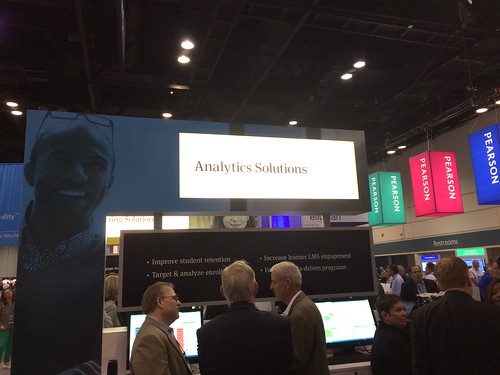
And more analytics.

And if you want some variety...
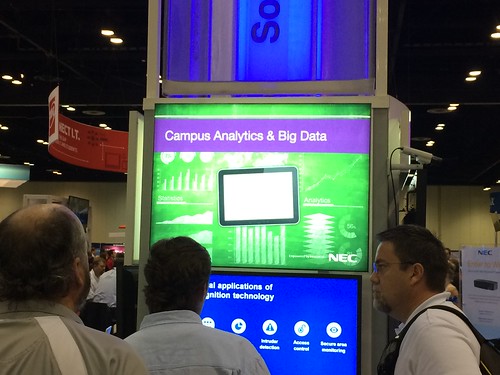
Of course, there was also a healthy dose of...
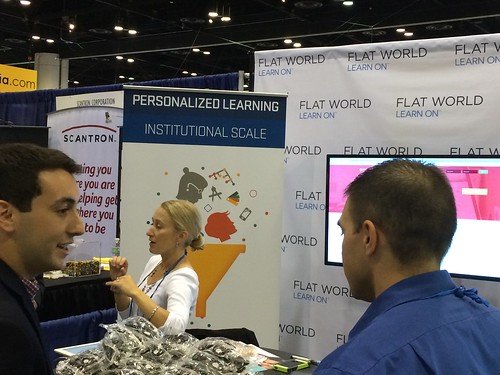
And a heaping portions of...
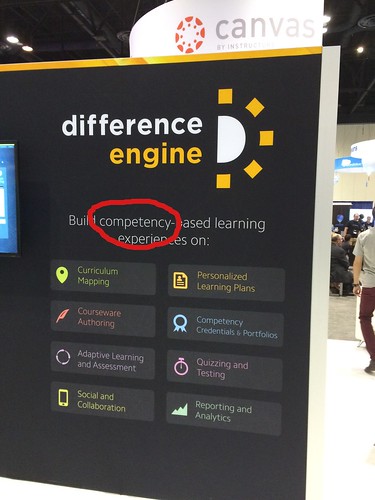
Naturally, there were also many smaller companies with worthy products and messages, such as...
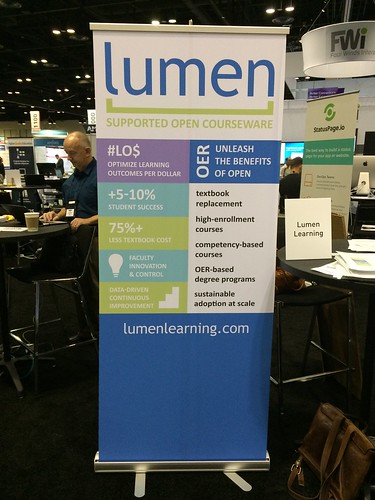
and...

and...
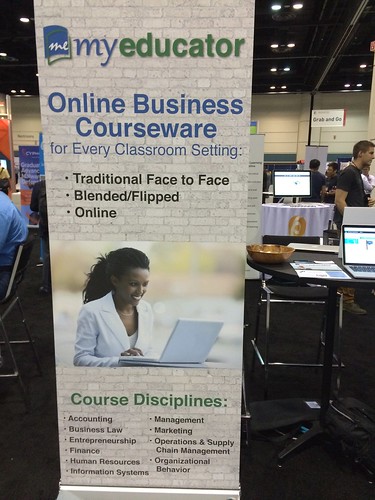
Then, somewhere in the midst of this...
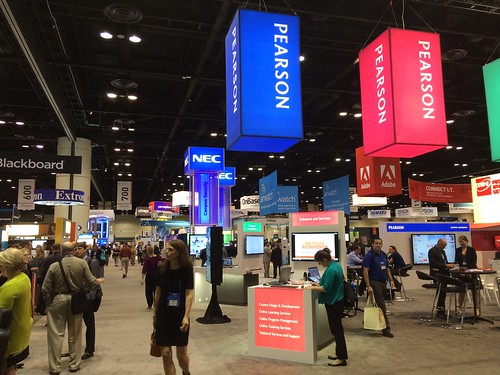
I stumbled across this ...
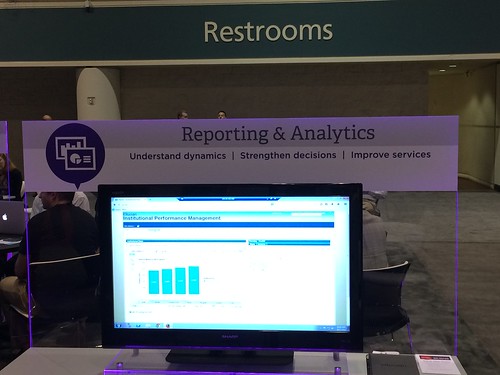
And I paused to ask myself, "What's wrong with this picture?"
The answer, at least for me, was clear. So many companies, so many products, and so many institutional solutions (almost all endorsed by institutions embracing or investing in them), all driven by the business of education. All driven by that most fundamental of business school questions -- What problem are we trying to solve?
At EDUCAUSE, it seemed evident that the problem we are trying to solve is that of making our businesses -- our institutions, companies, products -- more successful. Paraphrasing and linking the multitude of signs and signifiers on display in the Exhibit Hall, we want our businesses to be more successful in terms of user-friendliness, user retention, and user satisfaction. Judging from the many displays and demonstrations, it certainly seems that we have the technology to do these things and are devoting impressive amounts of money and human intelligence to reach our goals for success.
What problem are we trying to solve?
The question was being asked explicitly and implicitly at every presentation, booth, and meeting. It seemed that everyone had come ready to pitch their solution -- big or small -- for Higher Education, and could elucidate nicely how their solution solved an important problem in education and how it could help the bottom line (for institutions or investors).
But what problem are we trying to solve?
The question is a good one, but I felt it was being asked in the wrong context (at least for me). Instead of "What problem are we trying to solve in Higher Education?" I was wanting to hear, "What problem are we trying to solve in learning?"
That's because Higher Education, like education is general, is only a conduit for what really matters -- learning. Education, for all its temporal grandeur, is but an evolving symptom of a more important, and more fundamental human requirement -- learning. It is a container while learning is the elemental sustenance it is designed to hold.
Education is a cultural or civilizational artefact. It is tactical, linear, and concerned with corporate outcomes. It is about external achievement and measurement.
By contrast, learning is an inside-out proposition. It is about ongoing personal growth and is owned entirely by the individual learner. It can be facilitated by other learners but cannot be forced from the outside.
Education is about tangible measurements and standard outcomes, while learning resists measurement and delivers outcomes that are entirely unique for each learner.
Education is an institution and a market. It is something that can be quantified and managed. As a result, it condenses nicely into pitch decks and products that can be sold.
There is nothing wrong with that, of course. Education is a good thing and everyone I talked to at EDUCAUSE 2014 -- educators, administrators, publishers, educational technologists (institutional and corporate) -- seemed genuinely committed to and concerned about education. They were trying hard to create better containers for this thing that is learning.
But education is only a container, while learning is THE ACTUAL THING. No, learning may not lend itself to pitch-deck paradigms, but it is, ultimately, what really matters.
So I went to EDUCAUSE again and, as always, had fascinating discussions about educational technology, met really smart people with intriguing ideas, and was mesmerized by innovative products and marketing.
I also went to EDUCAUSE looking for ideas, for insights, for solutions that target the heart of our our mission, solutions that will help learners grow up and grow out.
I found much that was interesting and promising for education, but I'll admit, I left Orlando asking myself where all the talk about learning had gone.

The problem we are trying [ should be trying ] to solve in higher education is making education relevant in a rapidly changing world.
ReplyDeleteSimilarly, the problem in learning is the increasing lag time between the evolution of the learner and the evolution of the educational process.
The best way to learn is to start...
Rob, what you have said here captures exactly my sense of alienation from the whole process, as well as my fear that we have lost sight of learning even in our campus discussions (such as they are). Sure, I read all the news, keep up with the blogs... and on a DAILY basis I learn something new from teacher blogs that stimulate and even change my teaching, blogs by people (mostly K-12 teachers) like John Spencer, Pernille Ripp, Michelle Pacansky-Brock, etc.
ReplyDeleteBut what I read in Inside Higher Ed, etc., the "news" of the business, is something I rarely can connect with personally as a teacher, and at a certain point it makes me angry because it is those discussions that are sucking up all the oxygen and all the money, too, of course, and time, most precious of all - oxygen, money, and time all being in limited supply!
So, as always, THANK YOU for this post.
Laura, I really appreciate the comment. As you know, I have been on a somewhat Quixotic journey over the past 11 years, trying to find different ways to impact learning through commercial efforts. In spite of my own failure to date, I remain absolutely convinced that, with the right people and experience, it is still a viable option. That said, I find the situation to be a bit Orwellian, as the institutions and companies marketing to them begin to resemble each other more and more. In our efforts to grow solutions that will be funded (through investment or non-profit/government entities), we may have become more focused on the efficacy of business models than learning. Reading the news and blogs can be frustrating, but then I see what teachers like you are doing with regards to real learning and I am reminded why I care and why it matters. I remain ever optimistic that learning will find a way.
DeleteHaving the long view as we both do now really IS different than back when we were first starting out. Both my optimism and my pessimism (and I have plenty of both) are indeed different back in 1999. One thing I wonder about a lot, in fact, is what it is like for the people just getting started now. When I was getting started and very naive back in 1999, the landscape of THAT time no doubt had a big influence, even a determining one, on how I have turned out now. So... if I were that younger, more naive person just getting started now in 2014, how would the landscape of today shape my beginnings, my growth, etc...? Because it would definitely not be the same - it's not something I would want to label as better or worse or anything like that. But it would surely be different!
ReplyDelete